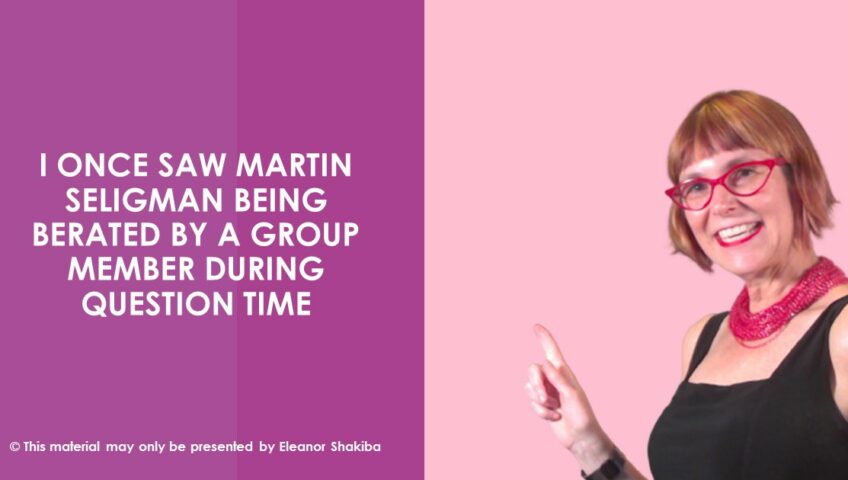It’s no secret I’m a lifelong learner. When I’m not upfront in the training room, I’m probably learning somewhere else. One of my favourite environments for learning is positive psychology conferences. There, I get to learn from the top minds in my field. Not only that, I get to model their stage skills. This makes the learning experience double layered. Which is why I’m always scribbling frantic notes whenever I’m learning.
Here are my favourite takeaways from the sessions I’ve attended over the years. This article will focus on stage skills, rather than positive psychology content. In a future article, I’ll share insights gained from the expert content delivered by these presenters.
Martin Seligman: the father of positive psychology
I have attended several sessions delivered by Martin Seligman. I am always impressed by his centred, calm presence. His charisma seems to influence everyone in the room. The most notable example of this was the day he arrived unannounced and stood at the back of a training room in Austria. Although the audience was not aware of his presence, there was a notable shift in the group’s energy. When Martin’s presence was acknowledged by the presenter, suddenly the change of atmosphere made total sense.
What have I learned from seeing Martin Seligman in action on stage? Most importantly, I gained insight into the power of grounded and respectful responding. This is a particularly useful skill when you’re facing a heckler or angry group participant. I once saw Martin Seligman being berated by a group member during question time. Her argument was that positive psychology was exploitative and dangerous. She was certainly passionate in her delivery, gesturing wildly and using very strong language. Martin Seligman stood directly in front of her, calmly acknowledging her statements. He was respectful and attentive, whilst also moving the conversation to a more constructive place. A masterful response.
Barbara Fredrickson: expert on positive emotions
Unfortunately, I haven’t yet seen Barbara Fredrickson live, because Covid19 led to conference cancellations in 2020. However, I did attend some online sessions, which she led masterfully. Her presentation was well structured and supported by simple, yet engaging, slides. What really stood out, though, was Barbara Fredrickson’s use of simple metaphors to build a theme through her presentation.
As an NLP trainer, these days, I tend to construct elaborate metaphors which feature intricate plots and characterisations. What I loved about Barbara Fredrickson’s metaphors, in contrast, was they were very simple. For example, she used a metaphor of eating a balanced diet to explain the role of different types of emotions in our lives. This made her point very clear. It also provided a reference point she could return to throughout the presentation. Since observing this pared back metaphor use, I started experimenting with it myself. What I found, is that more concrete learners prefer this style of metaphor. Intuitive ones, on the other hand, are engaged more by the complex NLP style metaphors.
Robert Biswas-Diener: positive coaching expert
I’ve seen Robert Biswas-Diener both online and on stage. He’s a superb presenter. His sessions are humorous, engaging and vibrant. I always learn a new stagecraft trick when I attend his sessions. So what’s the most important technique I’ve gleaned from him? It’s definitely Robert Biswas-Diener’s use of personal anecdotes to establish his authority and connect with his audience. Whether he’s talking about learning to paint or going through tribal scarification rituals in Africa, his stories entertain and embed key presentation messages at the same time.
What gave I learned from all this role modelling? It all boils down to one key message. Expressing your authentic self brings a presentation to life. Audiences don’t want facts, figures and data alone. What makes information resonate is the performance skills of the speaker. And the great news is that these can always continue being developed. So lifelong learners like me will always have something more to learn.
If you, too, are a facilitator or presenter who wants to be masterful in your stage skills, subscribe to my Positive Psychology Toolkit for HR and L&D Practitioners. This gives you access to fortnightly tips on improving both your professional expertise and your stage skills. Download it for free here.
About the author: Eleanor Shakiba
Eleanor is a specialist in positive psychology training. Her core strength is creativity, which she expresses in the training room through storytelling and visual design. She has dedicated her career to helping experienced professionals break through glass ceilings by developing their confidence, communication skills and leadership mastery. Eleanor is qualified in a range of fields including Social Anthropology, Positive Psychology, Counselling, Coaching, Adult Education and Neuro Linguistic Programming. She is also the author of the Positive Psychology Toolkit for HR and L&D Practitioners. This is a free resource for trainers and facilitators.
